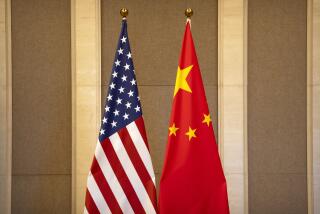CEOs Uneasy About Japanese Influence
- Share via
America’s top executives feel less comfortable with Japanese investment in the United States than with Canadian, British or European involvement in the U.S. economy, and they believe that Japan is not open to foreign investment, according to a survey released Monday.
The Conference Board survey of more than 400 chief executives of the nation’s largest corporations is believed to be the first attempt to measure how top U.S. business leaders feel about Japanese investment in the United States. Its findings are in line with recent nationwide polls that reveal Americans increasingly perceive Japan as a formidable economic competitor.
The survey on “Japanese Business and Investment Practices” showed that more than two-thirds of the top executives believe that continuing Japanese acquisitions will increase friction between the the United States and Japan.
Most attributed the criticism and discomfort over Japanese investment to the recent acquisitions of traditional American institutions, such as Rockefeller Center and Columbia Pictures, and to “a degree of cultural bias.”
In responding to questions on their views about U.S. investments from five specific countries, 73.1% of the CEOs felt most comfortable with investment from Canada, 62.0% from United Kingdom, 52.5% from the Netherlands, 50.1% from Germany, 37.5% from Japan and 31.9% from Saudi Arabia.
“Latest survey results reflect growing concern among U.S. business leaders over Japanese-U.S. relations,” said Preston Townley, president and chief executive of the Conference Board. “The free-market tradition is strong in the U.S., but the feeling is now widespread that Japan and some of this country’s other major trading partners clearly play by different rules.”
Although 9 of 10 of the chief executives said foreign capital can move freely into the United States, they said it is extremely difficult for foreigners to invest in Japanese companies. Although there “was considerable irritation with Japan’s barriers to investments by foreigners,” 57% of the respondents said that Japanese investment patterns overseas are not much different from those of American firms when the dollar was strong.
While the majority said that Japanese investment helps to bring advanced technologies and better quality control to the United States, they also expressed concern that Japanese purchases of U.S. firms provides them too much access to American technology.
The Conference Board, a nonprofit, New York-based business research group, said Nihon Keizai Shimbun, Japan’s leading economic newspaper, helped in the preparation of its survey questionnaire. It was the third of the Conference Board’s series of chief executive surveys on issues of critical importance to business.
American executives also had mixed views on other Japanese management and business practices. Most endorsed the Japanese policy of commitment to teamwork and the group over the individual. However, they rejected the practice of a worker spending his entire work life at one firm with promotions and raises based primarily on seniority rather than merit.
Surprisingly, the chief executives said it was appropriate for governments to grant loans and subsidies to assist key industries in maintaining a high level of technology. But they rejected, by a large margin, the Japanese practice of companies holding stock in other firms to promote one another’s management stability.
A majority said they liked the fact that Japanese companies did not have to worry about hostile takeovers, and 90% endorsed the principle of primary focus on long-term corporate strategies rather than short-term performance.
About half of the 400 company executives responding to the survey have annual sales volume of more than $1 billion. About 49% of total respondents were engaged in manufacturing; 18% finance, insurance and real estate; 13% business services and communications; 6% wholesale and retail trade, and 15% other, according to Fabian Linden, director of the Conference Board’s consumer research center.
INVESTING IN THE U.S.
Question: How do you feel about large corporations from each of the following countries participation in the U.S economy
Country Most comfortable CANADA 73.1 UNITED KINGDOM 62.0 NETHERLANDS 52.5 GERMANY 50.1 JAPAN 37.5 SAUDI ARABIA 31.9
Source: Conference Board
More to Read
Inside the business of entertainment
The Wide Shot brings you news, analysis and insights on everything from streaming wars to production — and what it all means for the future.
You may occasionally receive promotional content from the Los Angeles Times.










